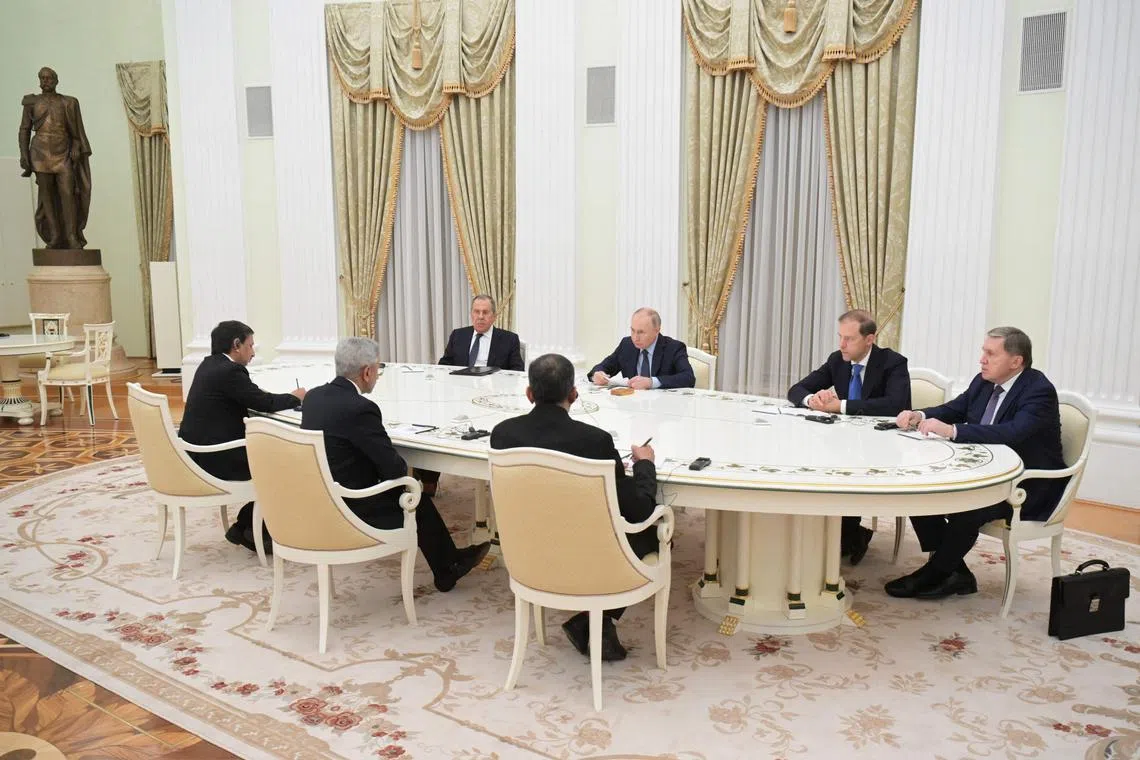Indian envoy meets Putin, bypassing Western pressure
Sign up now: Get insights on Asia's fast-moving developments

Russia's President Vladimir Putin (centre) attends a meeting with India's Foreign Minister Subrahmanyam Jaishankar (second from left) in Moscow on Dec 27.
PHOTO: AFP
NEW DELHI – Russian President Vladimir Putin on Dec 27 met the Indian Foreign Minister at the Kremlin, highlighting Russia’s attempts to break through its isolation from the West by pivoting to an increasingly powerful Asian nation.
From the start of Russia’s war with Ukraine, India has taken a neutral stance,
Russia has long been the most important military supplier for India,
In doing so, India has frustrated US efforts
“Everything is in your hands,” Mr Putin said, “and I can say that we are successful because of your direct support”.
Mr Putin added that he intended to discuss the situation with the war in Ukraine and invited India’s Prime Minister Narendra Modi to visit Russia.
Indian Foreign Minister Subrahmanyam Jaishankar said he brought Mr Putin a written letter from Mr Modi in which the Indian leader conveyed his thoughts on the state of Russia-India relations.
Earlier on Dec 27, Mr Jaishankar held a separate meeting with his Russian counterpart.
“We will focus on bilateral cooperation in different spheres, adjusting it to changing circumstances and demands,” Mr Jaishankar said, according to a Russian video broadcast. “We will discuss the international strategic situation, conflicts and tensions where they are.”
Russia’s Foreign Minister Sergei Lavrov said on Dec 27 that his country’s relationship with India goes beyond bilateral ties.
The two nations are interested in “building an international political and economic system that would be open and fair for everyone”, he said in televised remarks before the meeting.
Despite the Biden administration’s efforts to make supporting Russia costly, US officials have avoided open criticism of India.
Instead, President Joe Biden and others have courted Mr Modi, even welcoming him to a state dinner
That courtship has continued even after US law enforcement officials accused Indian officials in November of plotting the assassination of an American Sikh activist in the United States.
While Mr Biden generally has emphasised common ground with India, the Indian government’s crackdown on human rights is a clear point of friction in the relationship.
During the state dinner, protesters demonstrated against Mr Modi’s efforts to stifle dissent.
The relationship between the two leaders is driven by Mr Modi’s desire to assert his country as an economic superpower and Mr Biden’s need for a powerful ally to serve as a counterbalance to Russia and China.
After meeting with Mr Jaishankar for more than an hour, Mr Lavrov praised India’s “responsible approach” to global issues, which he said extended to its position on Ukraine.
He said the two men had spoken about the war, but did not elaborate, noting that it was one of several issues, including arms production and nuclear energy cooperation, that were discussed.
New Delhi is heavily reliant on Russia for the largest part of its arms imports, and Moscow has helped India to build nuclear and space capabilities from scratch.
A career diplomat, Mr Jaishankar has portrayed the close relationship between the countries as one of the few constants in a rapidly changing world.
His book about how India must carefully chart a multilateral diplomatic path is seen as a definitive take on the country’s foreign policy under Mr Modi.
“Typically, defence, nuclear and space are collaborations you only do with countries with whom you have a high degree of trust,” Mr Jaishankar had told members of the Indian diaspora in Moscow on Dec 26.
But the relationship shows signs of strain. Indian officials are increasingly worried that Russia’s pariah status will drive Moscow ever closer to China.
On another potential competitive front, all three countries are more forcefully portraying themselves as providing leadership and a model for developing nations around the world.
In a reflection of how India is trying to walk the line between Western pressure and its relationship with Russia, this is the second year in a row that Mr Modi has skipped
At the same time, India has refused to support resolutions at the United Nations that condemned Russian aggression in Ukraine.
Associate Professor Happymon Jacob, who teaches Indian foreign policy at Jawaharlal Nehru University in New Delhi, said that apart from India’s increased purchases of Russian oil, the relationship had been less close since the Ukraine invasion.
Still, he said, India will remain reliant on Russia to some degree, particularly in the energy and defence sectors.
“Russia is the only country that has provided India with nuclear reactors – notwithstanding the fact that India signed a nuclear deal in 2008 with the United States,” he said. NYTIMES


